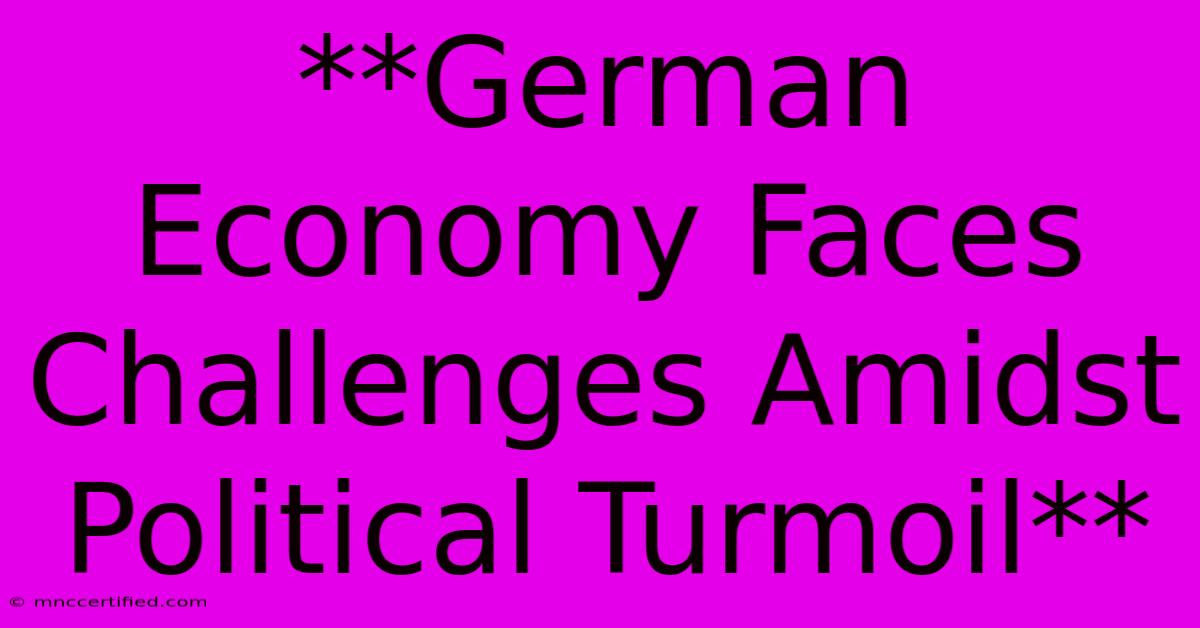**German Economy Faces Challenges Amidst Political Turmoil**

Table of Contents
German Economy Faces Challenges Amidst Political Turmoil
The German economy, renowned for its stability and strength, is facing a confluence of challenges amidst a backdrop of political uncertainty. While the country has traditionally been a beacon of economic resilience, recent developments have cast a shadow over its future prospects. This article delves into the key challenges confronting the German economy, examining their potential impact and the ongoing political landscape that further complicates the situation.
The Energy Crisis: A Looming Threat
The energy crisis, exacerbated by the ongoing war in Ukraine and the subsequent reduction in Russian gas supplies, has become a significant weight on the German economy. Energy prices have skyrocketed, impacting businesses across various sectors and pushing inflation to record highs.
Here's how the energy crisis is impacting Germany:
- Increased Costs: Businesses are grappling with rising energy bills, forcing them to cut production, raise prices, or even shut down operations entirely.
- Supply Chain Disruptions: The reliance on Russian gas has exposed vulnerabilities in Germany's energy supply chain, disrupting manufacturing and hindering economic growth.
- Consumer Spending Decline: High energy costs are squeezing household budgets, leading to reduced consumer spending, a crucial driver of the German economy.
Political Uncertainty: A Drag on Investment
The political landscape in Germany has become increasingly turbulent, impacting the confidence of businesses and investors. The recent change in government and the ongoing coalition negotiations have created a sense of uncertainty about future economic policies.
Here's how political uncertainty is impacting the German economy:
- Delayed Investments: Businesses are hesitant to invest in new projects or expansion plans while political clarity remains elusive.
- Loss of Confidence: The uncertainty surrounding economic policies can erode investor confidence, potentially leading to capital flight.
- Policy Inconsistency: The complex coalition negotiations and the need to balance competing interests could lead to inconsistent economic policies, creating challenges for businesses seeking stable frameworks.
The Need for a Comprehensive Strategy
Addressing these challenges requires a multifaceted approach. The German government is already implementing measures to mitigate the energy crisis, such as subsidizing energy bills and promoting renewable energy sources. However, more decisive action is needed to tackle the long-term structural issues hindering economic growth.
Here's what Germany needs to focus on:
- Energy Independence: Accelerating the transition to renewable energy sources and diversifying energy imports will be crucial to securing energy independence and reducing vulnerability to external shocks.
- Innovation and Digitization: Investment in research and development, fostering innovation, and promoting digitalization across all sectors will be essential for long-term economic competitiveness.
- Infrastructure Development: Investing in modern infrastructure, including transportation and digital networks, will enhance efficiency and create new opportunities for growth.
Conclusion: A Balancing Act for Germany
The German economy, while facing significant challenges, possesses inherent strengths and resilience. Navigating the current economic turbulence requires a delicate balancing act between tackling immediate challenges and implementing long-term structural reforms. By fostering stability, promoting innovation, and embracing a sustainable economic model, Germany can position itself for continued success in the years to come.

Thank you for visiting our website wich cover about **German Economy Faces Challenges Amidst Political Turmoil**. We hope the information provided has been useful to you. Feel free to contact us if you have any questions or need further assistance. See you next time and dont miss to bookmark.
Featured Posts
-
Outer Banks Season 4 Finale Breakdown
Nov 08, 2024
-
Bengals Vs Ravens Expert Tnf Predictions
Nov 08, 2024
-
Critchley On Hearts Defeat Unfortunate
Nov 08, 2024
-
Late Night Trump Victory Jimmy Kimmel Responds
Nov 08, 2024
-
Day Of The Jackal Remakes Real Story
Nov 08, 2024